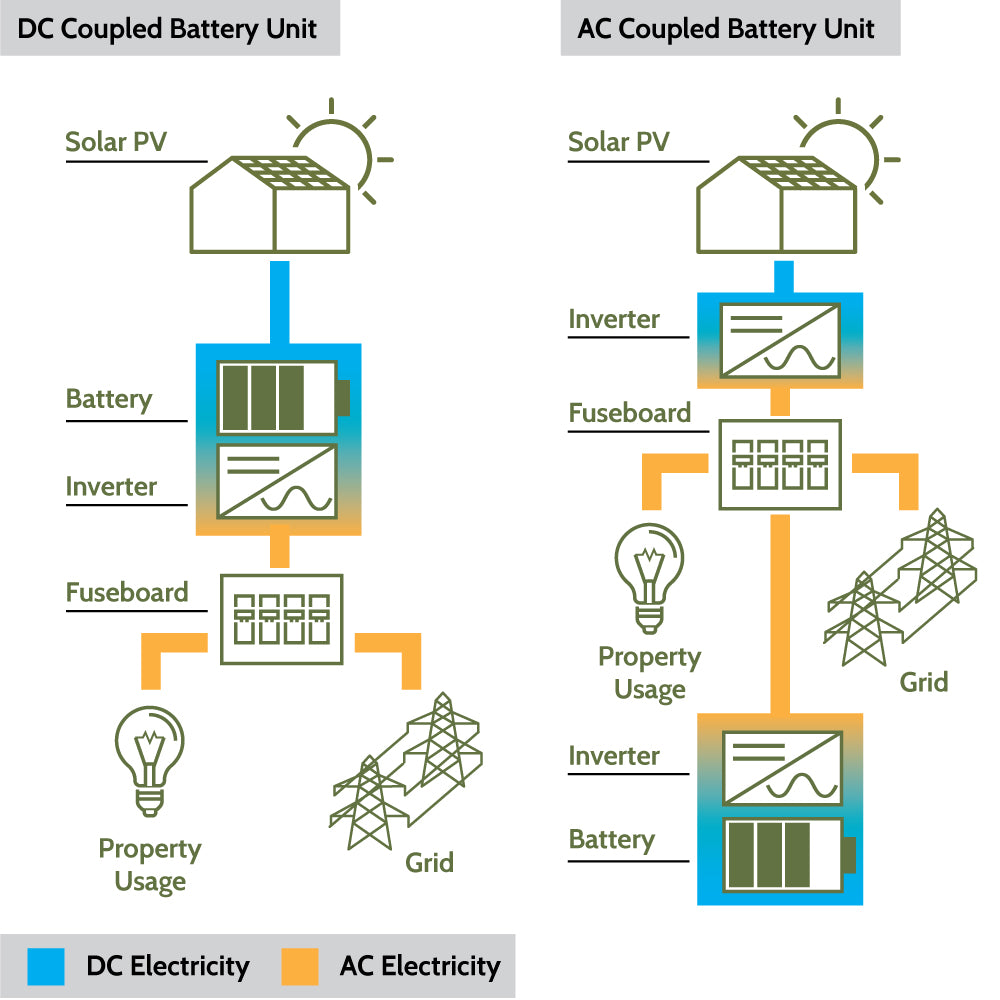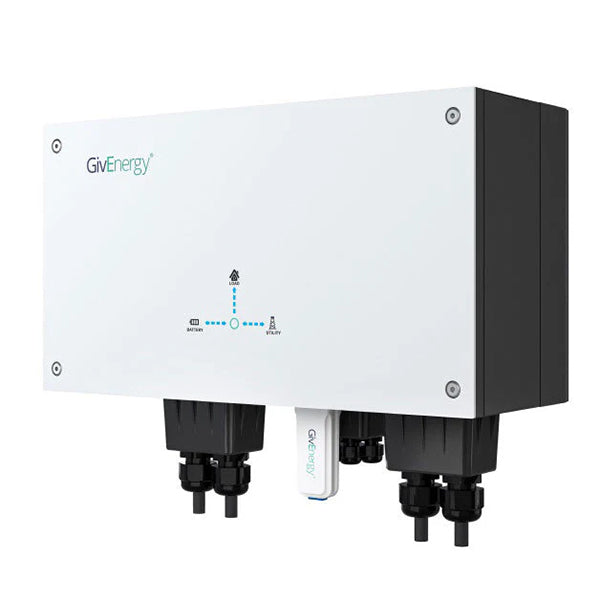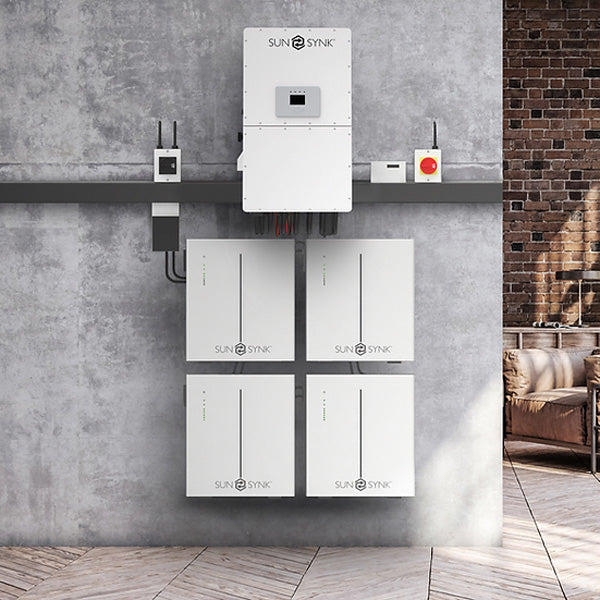Expert Help & Advice
Your guide to solar battery storage
Explore everything you need to know about solar batteries, from how they work to choosing the right type for your system. Whether you’re upgrading or installing new, this guide covers costs, lifespan and the benefits of battery storage to help you make the most of your solar energy.
What is a solar battery?
A solar battery stores electricity generated by your solar panels, allowing you to use it when your panels aren’t producing energy, such as at night or during cloudy weather. By storing excess power, solar batteries maximise the efficiency of your solar system and reduce reliance on the grid, making them a vital component for energy independence.
Why choose solar battery storage?
Solar batteries enhance the benefits of solar energy by storing unused electricity for later use. Investing in a solar battery can reduce energy bills in the long term and provide greater energy security, making it a cost-effective addition to your solar setup.

-
How does a solar battery work?
Solar batteries capture and store electricity generated by your solar panels. During the day, when the panels produce more energy than your property consumes, the excess power is sent to the battery. This stored energy can then be used during peak demand periods, when the sun isn’t shining, or in the event of a power outage, depending on your system’s setup.
Batteries can be wired into solar systems in two ways, known as AC or DC-coupled.

-
What is a DC-coupled battery?
DC-coupled batteries store the energy generated by the solar panels before it is converted to alternating current (AC) by an inverter. This setup reduces energy losses and improves efficiency as the battery charges directly from the solar panels, avoiding unnecessary DC-to-AC conversions.See our DC-coupled batteries

-
What is an AC-coupled battery?
AC-coupled batteries connect to your existing solar system via an AC-coupled inverter, making them ideal for retrofitting. The power generated by the panels is inverted to AC for home use before being stored in the battery.
Do I need a high- or low-voltage battery?
Choosing between a low- or high-voltage battery can depend on the size of your solar system and your property’s energy consumption.
Low-voltage batteries are suitable for most residential and small commercial installations, offering efficient energy storage for properties with moderate energy demands.
High-voltage batteries are designed for larger systems with higher energy requirements, such as industrial or commercial applications.
What is an all-in-one system?
All-in-one systems combine a battery and an inverter in a single unit. They are a convenient solution for those looking to streamline their solar energy setup.
These systems may include:
AC-coupled inverters paired with a battery, designed to work with a separate string inverter.
Hybrid inverters come with a built-in battery, enabling both energy storage and efficient solar energy conversion.
If you need help choosing a battery, contact us.
What does a battery management system (BMS) do?
The BMS tracks the battery’s operating temperature, current and voltage. It also calculates the battery’s remaining charge and monitors the health and safety of the battery by checking for internal shorts and loose connections. If unsafe conditions are detected that the BMS can’t address, it shuts off the battery to protect the system and its users.
Do I need a battery management system (BMS)?
Whether you need a BMS depends on the type of battery you choose. Some batteries have an inbuilt BMS as part of a single unit, which is simple to use but may require purchasing a whole new unit if you want to scale up. Others are designed to work with an external BMS, allowing you to expand capacity while using the same central BMS. There are also systems with a master and slave setup, where the master battery contains a BMS and limited capacity, and additional capacity can be added by connecting slave units.
If you’re unsure whether you need a BMS, get in touch and we will be happy to help.

-
Can solar batteries be retrofitted?
Yes, solar batteries can be added to existing systems as well as included in new installations. Retrofitting requires an AC-coupled inverter to integrate with your current system. For new installations, a hybrid inverter streamlines the process by combining energy storage and solar energy conversion into one system.
How much are solar batteries?
The cost of solar batteries varies depending on their capacity, type and brand. On average, prices for residential solar batteries range from £900 to £6,000 per unit, excluding installation. Larger systems, such as high-voltage batteries, can cost significantly more depending on their size and functionality.
What affects the price of solar batteries?
Capacity: Higher capacity batteries, measured in kilowatt-hours (kWh), cost more but can store more energy.
Type: Modular systems or all-in-one solutions may have higher upfront costs but offer additional benefits like scalability or simplified installation.
Brand and technology: Manufacturers often include advanced features like enhanced warranties, smart monitoring, or integrated inverters, which can affect the price.
How long do solar batteries last?
Solar batteries typically last 10 to 15 years, though this can vary based on usage, maintenance, and the specific technology used.
The lifespan of a solar battery is determined by:
Cycle life: Batteries are rated for a specific number of charge and discharge cycles. Lithium-ion batteries, for example, can last 4,000 to 8,000 cycles, which equates to roughly 10 years of daily use.
Depth of discharge (DoD): Batteries with a higher DoD can use more of their stored energy without affecting their lifespan, making them more durable.
Operating conditions: Proper ventilation and avoiding extreme temperatures help extend a battery’s life.
Do solar batteries come with a warranty?
While a battery’s efficiency may reduce slightly over time, modern systems are designed to maintain a high percentage of their original capacity even after a decade of use. Many manufacturers, such as those offered by HDM Solar Wholesale, provide warranties guaranteeing performance for 10 years or more, ensuring reliability and peace of mind.
Can you add extra batteries later?
Yes, many solar batteries on the market are modular. This means additional batteries can be stacked or combined later if you want to expand your system or increase capacity.
Who makes the best solar batteries?
There are many solar batteries on the market, so when selecting one, it’s important to choose a reputable manufacturer. The best battery for your needs will depend on its cost, capacity, power ratings, depth of discharge (DoD) and efficiency. HDM Solar Wholesale offers a wide range of solar batteries from leading brands like EcoFlow, Enphase, Sunsynk, SolaX, myenergi, GivEnergy and more. If you need help selecting a solar battery, feel free to contact our team for advice.






